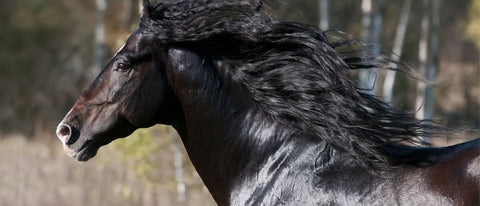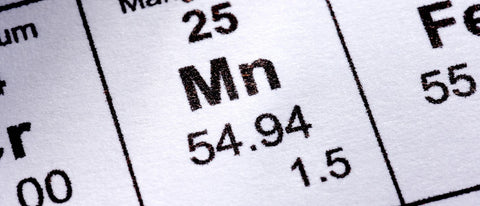
Florian ist aufgewachsen auf einem Bauernhof. Umgeben von Pferden, entdeckte er früh seine Faszination für diese majestätischen Tiere. Inspiriert von seiner reitbegeisterten Mutter, entwickelte er das Nahrungsergänzungmittel - Pferdegold. Seine tiefe Verbundenheit zur Natur und die leidenschaftliche Hingabe zu Pferden trieben ihn an, sein Unternehmen zu gründen.
When people hear the word "gastric ulcer," many don't think of a common equine disease. But in reality, many horses are affected, often silently.
The health problem "equine gastric ulcer syndrome"—the medical term for a stomach ulcer in horses—can affect both leisurely leisure horses in the pasture and high-performance racehorses on the racetrack. Therefore, it's time to address this issue and find out how we can best support the well-being of our horses with gastric ulcers.

Stomach ulcers in horses: What's behind them?
Gastric ulcers are not uncommon in horses . Although horses often send signals and show signs of discomfort, many gastric ulcers initially go undetected.
A watchful eye and knowledge of the symptoms can make the difference between well-being and discomfort for your horse .
But what upsets the stomachs of our beloved horses?
And what can actually cause stomach problems in horses?
The reasons are varied and range from stress to improper feeding to medication . Let's take a closer look.
EGUS, ESGD, EGGD: What are the differences?
Not all gastric ulcers in horses are the same. There are different types , depending on where they occur in the stomach.
EGUS (equine gastric ulcer syndrome): This is the general term for gastric ulcers in horses . However, within this category, there are even more specific subtypes.
-
ESGD (equine squamous gastric disease): This form of ulcer occurs in the glandless mucous membrane of the stomach.
Here, the stomach is less acidic, and the mucous membrane has few protective mechanisms against the acid. If this area is exposed to excessive amounts of stomach acid or irritating digestive products, injury or damage can occur.
-
EGGD (Equine glandular gastric disease): This term refers to ulcers in the glandular area of the stomach .
This is where acidic gastric juice is produced. Ulcers in this area develop when the acid-protective mechanism of the gastric mucosa is disrupted . Factors such as stress and feeding errors can play a role.
All causes of stomach ulcers in horses
Stomach ulcers in horses aren't just bad luck. They have their causes. Often, a combination of several factors can lead to this problem. To best help your horse, it's important to know and understand these causes. Only then can you take targeted preventative measures and support your horse's well-being .
Stress as a possible cause
Horses are naturally flight animals . Therefore, short, acute stressful situations are normal for them to a certain extent. It becomes problematic when the stress persists and becomes chronic.
Long-term stress, for example due to
- Lack of social contacts,
- Boredom or
- Constant struggles for dominance,
can promote the formation of stomach ulcers in horses.
Incorrect feeding as a possible cause
Feeding plays a central role in the health of the horse’s stomach . Mistakes in feeding, such as
- Too little good hay,
- Too long feeding breaks or
- Feeding concentrates that are too rich in starch,
can promote stomach ulcers.
The right horse feed and a supply of all necessary nutrients can play a crucial role in preventing and supporting gastric ulcers .

Poor posture as a possible cause
Inappropriate housing that offers the horse little freedom of movement or insufficient social contact can also lead to chronic stress .
This stress, in turn, can promote the development of gastric ulcers. It's therefore important to regularly check your horse's housing conditions and adjust them if necessary.
Excessive training as a possible cause
Intensive training , especially for sensitive horses, can cause stress . The rider's pressure and expectations can sometimes have a negative impact on the horse's stomach . Furthermore, intensive training can disrupt circulation in the digestive tract , thus promoting gastric ulcers.
Medication as a possible cause
Some medications, particularly those designed to reduce inflammation and relieve pain, can impair the protective function of the stomach lining .
When this protective barrier is disrupted, it opens the door to stomach ulcers. Therefore, it's important to always be vigilant when administering medication and keep an eye on its effects on the stomach.
Colic as a possible cause
Colic can be a direct consequence of stomach ulcers . Conversely, colic can also promote the development of stomach ulcers .
It's important to determine the exact cause of colic so that appropriate measures can be taken. If colic is suspected, always inform your veterinarian!
Signs of stomach ulcers in horses: The most important things at a glance
Stomach ulcers are a sensitive topic in the horse world. Our four-legged friends often exhibit symptoms that we don't immediately associate with a stomach ulcer.
But this is precisely where the challenge lies: recognizing the signs in time and interpreting them correctly .
-
Altered behavior: A horse with a gastric ulcer may be more irritable or lethargic than usual . This is often one of the first symptoms of a gastric ulcer in horses that owners notice.
-
Loss of appetite: If a horse suddenly refuses its feed or eats only hesitantly , this could be a sign of a stomach ulcer. Changes in eating behavior should always be taken seriously.
-
Weight loss: Despite normal feeding, a horse with stomach problems may lose weight . This is one of the most common symptoms of a gastric ulcer in horses. If your horse experiences unexplained weight loss, it should always be investigated further.
-
Colic symptoms: Colic is an umbrella term for abdominal pain in horses , which can have various causes—including stomach ulcers. Restlessness, repeated lying down, or repeatedly getting up can indicate colic in a horse and are serious warning signs. Prompt response and veterinary advice are essential in such cases.
- Decreased performance: A horse with a gastric ulcer may suddenly become listless, weak, or defensive during training. If you notice a sudden loss of energy, you should pay attention and try to get to the bottom of the cause.

Helpful measures to prevent stomach ulcers in horses
In order to effectively prevent stomach ulcers in horses, it is important to keep an eye on your horse's diet as well as its housing and training .
Each of these aspects plays a crucial role in the health of the horse’s stomach.
A healthy horse stomach through proper nutrition: What should be considered?
A healthy horse's stomach begins with proper nutrition. Pferdegold® Stomach can be a valuable companion in this regard.
This supplementary feed in practical pellet form was specially developed to combat nutritional deficiencies and promote digestion with targeted nutrient supply .
Pferdegold Magen supports harmonious digestion in horses. The carefully selected ingredients can promote relaxation and inner calm in the horse and encourage natural intestinal activity .
The natural ingredients in Pferdegold Magen are helpful here:
+ Apple pomace: This byproduct of apple juice production is known for its digestive properties. It contains valuable fiber, which can stimulate intestinal activity.
+ Beet syrup: This syrup, made from sugar beets, is not only a natural sweetener, but many horse owners also believe it has digestive properties and supports gastrointestinal function.
+ Bentonite: A naturally occurring clay mineral known for its absorbent properties due to its physical composition.
It can be beneficial as part of a balanced diet by helping to bind certain harmful substances in the digestive tract.
+ Chlorella: This freshwater algae is a true nutrient booster. It is rich in vitamins such as vitamin B12, vitamin E, and vitamin C, as well as minerals such as iron, magnesium, and zinc, which can contribute to the horse's overall health.
+ Hyaluronic acid: While it is best known for its supportive role in joint health, it is believed that hyaluronic acid may have the ability to form a protective film around the stomach lining and could therefore offer protection against negative influences on the horse's stomach.
+ Flaxseed: Flaxseed is also a special ingredient in Pferdegold Magen. It is not only a traditional horse feed, but also an important source of essential fatty acids . Flaxseed, or rather the natural mucilage in flaxseed, has proven particularly effective for gastrointestinal problems . According to the textbook "Phytotherapy in Veterinary Medicine," flaxseed is considered to soothe irritations, protect the mucous membranes, and act as a laxative (bulking laxative) . Flaxseed is used for constipation, gastritis (inflammation of the stomach lining), irritable stomach, irritable bowel syndrome, and enteritis (inflammation of the small intestinal mucosa) .
More expert feeding tips to prevent stomach ulcers:
-
Regular feeding times: A consistent feeding rhythm can help regulate stomach acid levels.
-
High-quality hay: This should be a primary source of nutrition for horses and can help prevent stomach ulcers.
-
Smaller, more frequent meals: Instead of two or three large meals, several smaller feedings throughout the day can keep the stomach constantly occupied and regulate acid production.
-
Avoid too many grains: Too many grains can increase stomach acid. It's better to maintain a balanced diet.
- Access to fresh water: Constant access to fresh water supports digestion and helps dilute stomach contents.
How species-appropriate housing and training can protect against stomach problems
Species-appropriate housing that allows the horse sufficient exercise and social contact is crucial to reducing stress and thus preventing stomach problems.
Training also plays a role. An overworked horse can experience stress, which negatively affects its stomach .
More expert tips on posture and training to prevent stomach ulcers:
-
Sufficient exercise: Horses should have the opportunity to move freely and graze every day.
-
Social contacts: Horses are herd animals and need contact with other horses.
-
Adapted training: Excessive or too intensive training can cause stress. It's important to adapt training to the horse's individual needs and abilities.
-
Protection from the weather: A shelter or box that protects against extreme weather conditions can reduce stress and promote the horse's well-being.
- Regular health checkups: Regular veterinary examinations and professional hoof care can identify and treat potential problems early, which can help prevent major health challenges.

How are gastric ulcers diagnosed in horses?
The diagnosis of gastric ulcers in horses requires a careful examination by a veterinarian .
The most common procedure is gastroscopy, in which a small camera is inserted through the horse's nose into the stomach.
This allows the veterinarian to view the stomach directly and identify ulcers or inflammation.
In addition to direct observation, symptoms and changes in the horse's behavior can also provide clues to the presence of gastric ulcers.
The correct treatment of horse stomach ulcers
The treatment of gastric ulcers in horses requires a holistic approach. Drug therapy is often used initially to reduce gastric acid production and promote healing. In addition to medication, it is crucial to review and adjust the horse's diet and husbandry .
The correct treatment can vary depending on the severity and cause of the gastric ulcer, so close cooperation with the veterinarian is essential to treat the equine gastric ulcer.
Conclusion
Gastric ulcers in horses are a serious issue, but one that can be addressed with the right knowledge and care.
It is important to recognize the signs early and prevent them.
Pferdegold® Magen supports the stomach and digestion with natural nutrients. Pferdegold Magen was developed to combat nutritional deficiencies and promote digestion with targeted nutrient intake. Close cooperation with your veterinarian and loving care are also valuable to ensure your horse receives the best possible care at all times.
After all, a well-informed and attentive horse owner is the first step to a healthy and happy horse.
FAQ
How long does a stomach ulcer last in a horse?
The duration of a gastric ulcer in a horse can vary. It depends on the severity of the ulcer, the treatment, and the horse's individual circumstances.
In some cases, mild ulcers can heal within weeks, while more severe cases may take several months to heal.
Can a horse's stomach ulcer be cured?
Yes, stomach ulcers in horses are curable in most cases.
With proper treatment, which often involves a combination of medication and adjustments in feeding and husbandry, the chances of recovery from a gastric ulcer in horses can be very good. However, it is important to act early and seek veterinary advice.
Can you ride a horse with a stomach ulcer?
It depends on the severity of the gastric ulcer and the horse's general condition. In many cases, light riding or exercise can actually benefit the horse.
However, it is important to avoid overexertion and stress. In cases of acute or severe ulcers, riding should be avoided and only resumed after consulting a veterinarian.

















